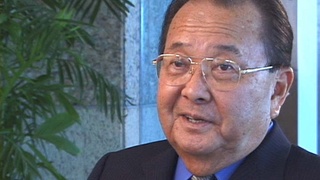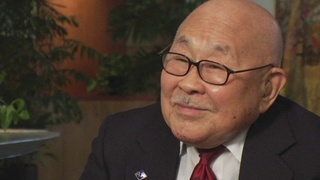Interviews
Sings traditional plantation labor song (ho-le ho-le bushi) in Japanese and Hawaiian
[The ho-le ho-le bushi is about dragging the cane cuttings through the fields. Mrs. Kasahara learned the song by hearing it on a record.] (Japanese and Hawaiian)
nihon derukya yo-
hitori de detaga
imajya komoaru magomoaru
sonowakya chaccha (secret) de
nuinui (very, a lot) maitai (great)
hanayome goryo deyo
yobiyose rarete
yubiori kazoete Gojyu-nen
sonowakya chaccha de
nuinui akamaina…kamaaina (nice native peoples)
Kane (man, husband) wa kachiken niyo
Wahine (woman, wife) wa happaiko
huuhu sorotte tomokasebi
sonowakya chaccha de
nuinui hanahana (works)
asu wa Sunday jyayo~
Wahine (wife) mo turete
Aikane (friend) houmon to dekakeyoka
sonowakya chaccha de
nuinuihorohoro(amuseuments)
English translation
When I left Japan,
I was alone.
Now I have children and even grandchildren, too.
Its reason is secret but it’s very great.
As a bride,
I came to this country.
I am eagerly waiting for 50 years.
Its reason is secret, but great natives.
Man (husband) is Kachiken (cuts sugar cane)
Women (wife) is Happaiko (carrying sugar cane)
We worked together.
Its reason is secret and a lot of works.
Tomorrow is Sunday.
Take wife (with me)
Let’s visit a friend.
Its reason is secret and great pleasure.
It includes language of Hanaka(?)
Date: June and July, 1991
Location: Hawai`i, US
Interviewer: Robert Nakamura, Karen Ishizuka
Contributed by: Watase Media Arts Center, Japanese American National Museum.







